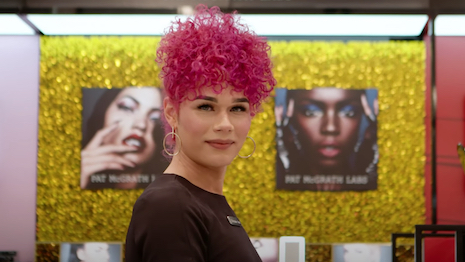 LGBTQ+ employees who are out at work are more empowered and feel more comfortable about speaking up, being themselves and building close friendships at the office. Image credit: Boston Consulting Group
LGBTQ+ employees who are out at work are more empowered and feel more comfortable about speaking up, being themselves and building close friendships at the office. Image credit: Boston Consulting Group As corporations work to make their businesses more inclusive, a new survey from Boston Consulting Group (BCG) shows LGBTQ+ employees who do not feel comfortable coming out during their first 12 months at a workplace are unlikely to do so ever.
This is highly dependent upon a company’s willingness to create an environment in which employees feel comfortable expressing themselves and sharing their identities. Especially in the luxury fashion and beauty sectors, where self-expression and authenticity are celebrated, it is imperative that brands internally foster inclusive cultures.
“Over the past couple of years, luxury companies, such Prada, LVMH and Kering, have created a new position of head of diversity and inclusion,” said Matt Krentz, managing director and senior partner at BCG, Chicago. “The diversity of models has become one of their priorities, be it on fashion shows, in advertisements or on social networks.
“However, brands have also begun to pay attention to the representation of all diversities within the company and across all aspects of business from marketing to recruiting.”
BCG surveyed approximately 8,8000 people in 19 countries. The sample was not representative of the overall population or all industries, instead skewing toward employees who work in corporate settings and possessed relatively high levels of education.
Respondents tended to work for companies that had relatively advanced LGBTQ+ policies and programs. The survey covered trans and gender nonconforming employees as well.
Inclusivity in the workplace
For the LGBTQ+ community, coming out is not necessarily one-time occurrence, but rather a journey defined by daily decisions and interactions.
According to BCG, many LGBTQ+ individuals choose to conceal their identities even after initial disclosures.
Across the countries surveyed, 25 percent of those who described themselves as mostly out at work said that they would lie on occasion, omit details or avoid answering questions about their sexual orientation.
Overall, 70 percent of LGBTQ+ respondents said that they came out during the hiring process or within their first 12 months of starting their job.
Only 10 percent came out after the first year, and the remaining 20 percent stayed closeted, underscoring the importance for companies to create inclusive cultures from day one for all employees.
 Tiffany & Co. launched a “Stand For Love” campaign to celebrate members of the LGBTQ+ community during Pride Month. Image credit: Tiffany & Co.
Tiffany & Co. launched a “Stand For Love” campaign to celebrate members of the LGBTQ+ community during Pride Month. Image credit: Tiffany & Co.
This conclusion has major implications for companies, as employees who feel comfortable sharing their identity at work are more empowered.
On average, 24 percent of LGBTQ+ people surveyed across all countries believe that being out at work is an advantage professionally and 53 percent see it as a neutral factor. However, 23 percent seeing coming out as a disadvantage in the workplace, some worrying that doing so is a potential risk to their careers.
These attitudes also vary by country.
In Australia, 50 percent of LGBTQ+ employees see being out at work as an advantage, as do 43 percent of respondents in the United States. In contrast, 40 percent of LGBTQ+ respondents in Mexico and 36 percent in France see coming out as a disadvantage.
More than half (58 percent) of LGBTQ+ individuals experience discrimination in the workplace, such as discriminatory jokes, not being taken seriously or a lack of social inclusion. These rates were highest among those who described themselves as “partially out.”
Providing an environment in which LGBTQ+ employees feel comfortable bringing their authentic selves to work from day one is not a matter of rolling out a multitude of new initiatives.
BCG suggested companies develop a holistic plan to ensure that all stages of an employee’s journey during their first year reflect and are shaped by a diverse, equitable and inclusive culture.
Companies can build a solid foundation by ensuring that the right HR policies and supportive infrastructure are in place and are communicated effectively.
They can focus on building a truly diverse workforce, including making targeted outreach to LGBTQ+ candidates and giving them support throughout the process.
 Sephora spotlighted employee and makeup artist Chrissie Vee for a campaign honoring Transgender Visibility Day. Image credit: Sephora
Sephora spotlighted employee and makeup artist Chrissie Vee for a campaign honoring Transgender Visibility Day. Image credit: Sephora
Businesses should also connect LGBTQ+ employees with mentors who can help them navigate their careers and be a resource in managing any concerns or issues, as well as create a respectful, inclusive culture, with a structured program in place for allies that offers sensitization training on diversity, equity and inclusion.
Companies can include regular and frequent expressions of support for, celebrations of and events that recognize the Pride movement, and support broader LGBTQ+ rights and inclusion as a regular component of the company’s calendar.
Luxury supporting LGBTQ+
While the journey toward complete equality and inclusion is far from complete, luxury companies have been making strides in supporting the LGBTQ+ community, from initiatives and Pride Month campaigns to restructuring hiring and employment processes.
“As the success of luxury brands is built on driving desire and a deep understanding of identity, it is critical to be relevant across a diverse spectrum of audiences,” Mr. Krentz said. “Desire is highly emotive, and it requires luxury brands to have empathy and understanding for who their consumers are and how they view their identity.”
In January, French luxury conglomerate Kering’s Americas division was named one of the best places to work, according to the Human Rights Campaign Foundation’s annual assessment of LGBTQ workplace equality.
Kering Americas received a score of 100 on the foundation’s 2021 Corporate Equality Index (CEI). Corporations are evaluated in several categories, including non-discrimination policies, employment benefits, organizational competency around LGBTQ diversity and inclusion.
The luxury company joined more than 760 U.S.-based companies that earned top scores in the CEI. Fifty-seven percent of CEI-rated businesses, including Kering, have global operations and advance LGBTQ inclusion abroad (see story).
LVMH-owned beauty retailer Sephora promoted Transgender Day of Visibility with a short film highlighting how the retailer's products have fostered a transgender woman's life and journey.
The vignette — which is part of a series entitled “Stories of Belonging” that celebrates Sephora team members — follows Chrissie Vee, a makeup artist at the retailer. Ms. Vee discusses her childhood, her early manifestation of femininity and the role Sephora products have in assisting her to live her most genuine life (see story).
“Leading beauty brands are becoming accountable for the importance of giving back, whether through creative representation or financial support,” BCG’s Mr. Krentz said. “However, though progress has been made, the use of DEI departments should be viewed by the luxury industry as not only a way to end a culturally insensitive scandal but as the beginning of a new system that truly introduces internal change.
“The luxury industry should move away from Diversity and Inclusion being an initiative to an ongoing business imperative to lead the way.”